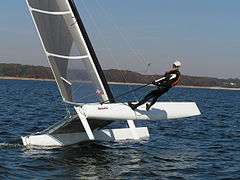International A-class catamaran

The A-Class Catamaran, often abbreviated to A-Cat, is a development class sailing catamaran for singlehanded racing.[1]
Background
The class was founded during the 1960s and was part of the 4-tier IYRU (now ISAF) approach to divide up the sports catamaran sailing scene into 4 separate groups. These A, B, C and D classes were governed by a very small set of class rules to which each design had to comply.[2] In the beginning it was just:
- Maximum hull length
- Maximum overall width
- Maximum sailarea
All boats designed and built to these specs would be grouped into one fleet and race each other for crossing the finish line first.
The A-Class is the largest remaining of those 4 main classes. The B-Class quickly splintered into a score of sub classes like the Hobie 16's, Formula 18's and other classes that contain far more and far stricter class rules. The C-Class quickly developed into the really high tech and vanguard boats that were used in the Little America's Cup. These require immense investments of time and money to race. As a result, this class is extremely small but still maintains its status as the ultimate sailing catamaran designs. The D class never really got off the ground in earnest.
Specifications
The official organisation for the A-Class catamaran is the IACA (International A division Catamarans Association).
The A-Class rules were expanded over time to prevent the cost of these boats from rising too high and to ensure fairness in racing.
Currently the main A-Class class rules are:[3]
- Min overall boat weight : 75 kg / 165.3 lbs
- Max overall boat length : 5.49 m / 18.3 ft (= still the old IYRU rule)
- Max overall boat width : 2.30 m / 7.5 ft (= still the old IYRU rule)
- Max sail area incl. mast : 13.94 m2 / 150.0 ft2 (= still the old IYRU rule)
In handicap racing, the A-Class catamaran uses a Portsmouth Yardstick of 681 in the UK[4] or a D-PN of 64.5 in the USA.[5]
Current situation
The A-Class design has over time converged to a single sail rig using a lightweight carbon mast of about 9 meters length and using lightweight pentex or Kevlar sailcloth. The hulls and beams are often made out of carbon fibre as well. This single sail rig (just a mainsail) allows these boats to truly excel when sailing upwind. Their lightweight and time tested sailing techniques make these boats very fast on reaches and downwind legs as well. They were often unbeatable on the race course and only with the introduction of the asymmetic spinnaker on other catamarans have they lost this position a little bit.
In the decades since their foundation the A-Class has gathered a significant international following and it has class organisations in many countries around the globe. Their world championships often attracts around 100 boats and sailors. It is also a class that still contains a significant portion of homebuilders, although their numbers are decreasing with every year due to the skills required to make a competitive boat. However, nearly all A-Class sailors tinker with their setups and boats. As it is a developmental class and the rules do allow so much variation, it is paramount that a top sailor keeps experimenting with new setups and generally tries to improve the design even more. Because of this general character of the class, the A-Class is often leading over other catamaran classes in terms of design development. Over time these other classes copy new findings for their own setups. Examples of such developments are: the carbon mast, the squaretop mainsail, the wave-piercer hull design and in general the use of exotic materials.
Builders
Apart from the list below of some of the commercial builders, the A-Class catamaran can be home-built:
- Bimare (Italy) (http://www.bimare.org/)
- Aicher-Egner Technologie GmbH (Germany) (http://www.flyer-acat.de/)
- Marstrom (Composite AB Sweden) (http://www.marstrom.com/)
- Performance Catamarans (Nacra) (USA)
- Scheurer Design & Eng. (Switzerland) (http://www.d3-a-cat.com/)
- Scheurer Bootswerft AG (Switzerland) (http://www.scheurerwerft.ch/scheurer/)
- VectorWorks Sail (USA)
- Wingfox (Poland) (http://www.wingfox.pl/)
- DNA (Netherlands) (http://dnaperformancesailing.com/)
- Vision (Netherlands) (http://www.catamaranparts.nl/)
- Nikita (Germany)
- Exploder (Poland) (http://www.exploder.info/)
Events
World Championships
| Year | Gold | Silver | Bronze |
|---|---|---|---|
| 1981 Bontan Bay | |||
| 1982 Cesenatico | |||
| 1984 Wellington | |||
| 1985 Spray Beach | |||
| 1986 Brenzone | |||
| 1987 Blairgowrie | |||
| 1988 Turkey Point | |||
| 1990 Napier | |||
| 1991 Grömitz | |||
| 1992 Silvaplana | |||
| 1993 Sanguinet | |||
| 1994 Lake Cootharaba | |||
| 1995 Andijk | |||
| 1996 L'Estartit | |||
| 1997 Long Beach | |||
| 1999 Port Phillip | |||
| 2000 Cesenatico | |||
| 2001 Castelldefels | |||
| 2002 Martha's Vineyard | |||
| 2004 New Plymouth | |||
| 2005 Sanguinet | |||
| 2006 Västervik | |||
| 2007 Islamorada | |||
| 2008 | NOT HELD | ||
| 2009 Belmont (AUS) | |||
| 2010 Cesenatico | |||
| 2011 Århus (DEN) | |||
| 2012 Islamorada Key | |||
| 2013 | NOT HELD | ||
| 2014 Takapuna NZL | |||
| 2015 (ITA)[6] | |||
| 2016 Medemblik (NED) [7] |
Class websites
- International A-Division Catamaran Association (IACA) (http://www.a-cat.org)—National A-Catamaran Organisations:
- Australia (http://www.a-cat.org.au/)
- Austria (http://www.aaca.at/)
- Belgium (http://www.baca.be)
- Brazil (http://www.abca.esp.br/acat/default_por.asp)
- Denmark (http://www.a-cat.dk)
- Germany (http://www.a-cat.info)
- Great Britain (http://www.aclasscatamaran.co.uk)
- France (http://www.afcca.org)
- Italy (http://www.classeaitalia.it)
- New Zealand (http://www.a-class.org.nz)
- Netherlands (http://www.a-cat.nl)
- Poland (http://www.katamaran.sopot.pl/aklasa.htm)
- Sweden (http://www.a-cat.se/)
- Switzerland (http://www.saca.ch)
- Spain (http://www.adecat.com)
- United States of America (http://www.usaca.info/)
See also
References
- ↑ http://www.eyeforlife.com/acat/?file=kop1.php
- ↑ http://www.a-cat.org.au/history.html
- ↑ http://a-cat.dk/prog/class_rules.asp?Language=&Menu=2
- ↑ "Portsmouth Number List 2012". Royal Yachting Association. Retrieved 31 July 2012.
- ↑ "Multihull Classes". US Sailing. Archived from the original on 16 August 2012. Retrieved 30 July 2012.
- ↑ http://www.aclassworlds2015.it/
- ↑ http://www.acatworlds2016.nl/